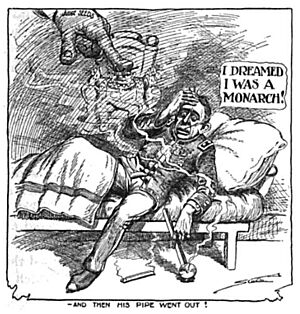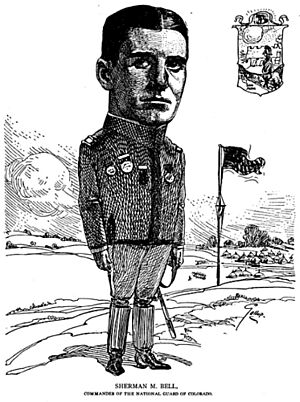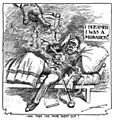Sherman Bell facts for kids
Adjutant General Sherman M. Bell was a well-known leader of the Colorado National Guard during the Colorado Labor Wars of 1903–04. Some people, like President Theodore Roosevelt, praised him highly. However, many miners and leaders of the Western Federation of Miners (WFM) saw him as a harsh ruler.
Sherman Bell was once a deputy United States marshal in Cripple Creek, Colorado. He also fought in the Spanish–American War as one of Roosevelt's Rough Riders. Bell was part of groups like the Masonic Order and the Order of Elks. He had managed a hardrock mine before. During a strike by smelter workers and miners in the Cripple Creek District, Bell supported the Mine Owners' Association against the striking workers.
Contents
Who Was Sherman Bell?
Many stories about Sherman Bell focus on his strong personality and how he acted. One person who interviewed him in 1904, William MacLeod Raine, said Bell was very sure of himself. Raine felt that Bell made quick decisions without always looking at all the facts. He also said Bell didn't care much about rules or laws if he thought his way was better. Bell was not open to changing his mind and didn't care what others thought of his actions. Raine also noted that Bell rarely smiled, except when talking about how he had dealt with the Western Federation of Miners.
J. Anthony Lukas wrote in 1998 that Bell sometimes saw his fights against the miners' union as a "holy war." Bell often said his actions were guided by "Me, God, and Governor Peabody." Even if his military skills were questioned, Bell was known for saying things in a very clear and strong way.
General Bell was very direct about his goals. He once said, "I came to do up this ... anarchistic federation." He believed his actions were necessary for military reasons, saying that military needs didn't follow regular laws.
Benjamin Rastall said that when Bell returned from the Spanish-American War, people admired him for a while. But he soon lost public support because he seemed too proud and bossy. Rastall felt Bell wanted to make a big show of his military power and become famous as a leader.
Sherman Bell's uniform was very fancy, costing about a thousand dollars. It had gold lace, cords, and tassels. But sometimes, he would also wear a simple, old hat, a black shirt, and a plain tie.
Not everyone disliked Bell. Weston Arthur Goodspeed wrote in 1904 that Bell was a strong figure during the Colorado Labor Wars. Goodspeed said Bell bravely faced the conflict and brought order back to the mining areas. He believed Bell saved lives and property and restored law.
Goodspeed called Bell world-famous and said he was the most successful person at stopping strikes. He described Bell as strong, soldier-like, and brave. Goodspeed also said Bell was kind and caring towards his soldiers.
According to Goodspeed, Bell transformed the Colorado militia from a small, untrained group into a well-organized and skilled military force. President Theodore Roosevelt reportedly said, "I never saw such resolution as Sherman Bell displayed. If I had a regiment and could have only one man in it, that man would be Sherman Bell."
Bell also served with Roosevelt's Rough Riders in Cuba. Even though he was suffering from an injury, he managed to stay with his troops. Roosevelt praised Bell's "splendid service." However, another soldier, Billy McGinty, described how difficult it was to move an injured Bell to safety. Later, Bell seemed to exaggerate McGinty's role in saving his life when telling stories about Cuba.
Raine observed that Bell's "reckless irresponsibility" often caused problems for his leaders. When Theodore Roosevelt was campaigning in 1900, Bell became his bodyguard. After a speech, some miners seemed to disrespect Roosevelt. When they threw stones at Roosevelt's train, Bell confronted them. Roosevelt, annoyed by the conflict, ordered Bell to go inside the train. Roosevelt later told reporters he feared Bell might start hurting people.
Deputy Sheriff Days
As a deputy sheriff in El Paso County, Sherman Bell once used his pistol to shoot out the lights in a dance hall. This helped arrest three people who had stolen gold.
Colorado Labor Conflicts
In 1903, the Western Federation of Miners (WFM) called a strike for smelter workers in the Colorado Springs, Colorado area. This strike soon spread to Cripple Creek. The Colorado National Guard brought in many rifles and ammunition to the area.
As a Brigadier General of the Guard, Sherman Bell had a conflict of interest. He had previously managed mining businesses in the Cripple Creek District. Besides his state salary, he also received extra money from the mine owners.
On September 10, the National Guard began arresting union officers and members who supported the unions. When a judge tried to hold a hearing for four union men held by the Guard, Sherman Bell reacted strongly. About ninety cavalrymen surrounded the courthouse. Soldiers stood in the courtroom during the hearing, and others set up a machine gun outside. An attorney for the prisoners refused to continue because of the intimidating display. Despite this, the judge ruled that the prisoners should be released.
However, General Chase, working with General Bell, refused to let the men go until Governor Peabody ordered it. Even newspapers that had supported the Guard's presence worried that court orders were not being followed.
The Colorado Constitution stated that the military must always follow civil power. The court ruled that Bell and Chase should be arrested for breaking the law. Bell responded by saying no civil officer could arrest a National Guard officer on duty.
Within a week of the troops arriving, several mines started working again. Replacement workers were almost forced to go to work. Mine owners recruited workers from other states, telling them there was no strike. One worker, Emil Peterson, tried to run away when he realized he was being escorted by the military. A lieutenant shot and killed him. The military officers ignored an arrest warrant for the lieutenant.
The Cripple Creek Mine Owners' Association (CCMOA) began pressuring companies to fire union miners. Companies that refused were put on a blacklist. When one company told its employees to quit the WFM, the workers joined the strike instead.
On November 21, two managers at the Vindicator mine died in an explosion. The cause was unknown. Even though soldiers heavily guarded the mine, the CCMOA blamed the WFM. Fifteen strike leaders were arrested, but there was no proof of their involvement, so they were never charged.
The union blamed the mine owners for the explosion, saying it was a failed plot. This incident and attempts to damage a train caused high tension and rumors in the Cripple Creek District. People said a group called the Committee of 40 was formed to keep order. Miners formed a "Committee of Safety" because they feared the Committee of 40 would cause violence and blame it on the WFM. The National Guard increased its pressure. On December 4, 1903, the governor declared that Teller County was in a "state of rebellion" and put it under military law.
Sherman Bell immediately announced that "the military will have sole charge of everything." The governor seemed embarrassed by Bell's public statement and tried to calm public fears. But Bell continued. Within weeks, the National Guard stopped basic rights. Union leaders were arrested or sent away. Prisoners who won their cases in court were released, then immediately arrested again. A local newspaper was censored, and union-friendly news was banned. People were not allowed to gather. The right to own guns was suspended, and citizens had to give up their firearms. An attorney who dared the Guard to take his guns was shot in the arm. In January 1904, the Guard made it a crime to "loiter" or "beg" or not have a clear way to support oneself.
An officer named Francis J. Ellison was assigned by General Sherman Bell to the Cripple Creek District. Ellison found evidence about the Vindicator explosion that could have led to arrests. However, Sherman Bell did not follow up on this evidence.
On January 26, 1904, a cage full of non-union miners fell at the Independence mine. The investigation found that the management was careless. They had not installed safety equipment correctly, and the new worker operating the lift was not experienced.
The WFM said the company was careless, while management claimed the WFM had damaged the lift. This was despite the union not being able to access the mine, which was guarded by soldiers. After this, 168 men reportedly quit the mine.
Around February 1904, leaders of the Colorado National Guard worried that mine owners were not paying the soldiers' wages. A general ordered an officer to threaten the mine owners to pay. The officer and another soldier fired shots into the Vindicator and Lillie mine buildings. This worked, and the mine owners paid. The officer later said that General Sherman Bell and Governor Peabody knew about this plan.
On March 12, troops took over the WFM's Union Hall in Victor. Shopkeepers were arrested for showing union posters. The CCMOA then pressured employers to fire union miners, requiring a "non-union card" to work. The WFM tried to fight back.
Despite all the pressure, only 300 of the original 3,500 striking miners had returned to work. Most miners still supported their union. It seemed the non-union mine owners were facing difficulties, and the union believed it was winning the strike.
On March 28, 1904, WFM President Moyer was arrested.
The Colorado Supreme Court got involved. A later complaint to the United States Supreme Court said that "said Sherman Bell and the said Buckley Wells loudly and boastfully ... threatened the destruction and death of anyone who should interfere or attempt to interfere with them." It also said that the sheriff could not enforce court orders because Bell and the governor had a much larger force.
On June 6, 1904, a terrible explosion happened at the Independence Depot. Thirteen non-union men died, and six were hurt. The sheriff quickly secured the area and started an investigation.
The district became divided, with people either believing the WFM was innocent or guilty.
Right after the explosion, the CCMOA and the Citizens' Alliance met and planned to remove all local officials they didn't control. Their first target was Sheriff Robertson, who resigned. The mine owners replaced him with someone who was part of their groups. In the next few days, they forced over thirty local officials to resign and replaced them with people who were against the WFM.
Ignoring county officials, the employers called a town meeting near the WFM Union Hall. The city marshal tried to stop the meeting, but the mayor, who supported the mine owners, fired him. A large, angry crowd gathered, and anti-union speeches were given. One speaker, C. C. Hamlin, gave a very angry speech that stirred up the crowd. A shot was fired, followed by many more.
Fifty union miners went into the union hall. A group of National Guard soldiers, led by a mine manager, surrounded the WFM building. They took positions on rooftops and fired into the hall. Four miners were hit, and the men inside had to surrender. The Citizens' Alliance and their allies then destroyed the hall and other WFM halls. They also looted four WFM stores. The workers of the local newspaper were arrested again. On the day of the explosion, all mine owners, managers, and supervisors were made deputies. Groups of soldiers, deputies, and citizens searched the area for union members. About 175 people, including union men, supporters, and city officials, were held in outdoor pens. They were not given food until a women's group was allowed to feed them.
On June 7, the day after the explosion, the Citizens' Alliance held unfair trials and sent 38 union members away. General Sherman Bell arrived and tried to make these deportations seem legal. He "tried" 1,569 union prisoners. Over 230 were found "guilty" because they refused to leave the union. They were put on special trains and dropped off across the state line. In just a few days, the Western Federation of Miners was largely destroyed in Colorado's mining towns.
When asked why the deportations happened, Sherman Bell said, "It is a military necessity. They are men against whom crimes cannot be specified, but their presence is regarded as dangerous to law and order."
Coal Miners' Strike
The United Mine Workers of America tried to organize coal miners in Colorado in 1903 and called a strike. Adjutant General Sherman Bell was also put in charge of this strike. The Colorado National Guard again sided with the mine owners against the miners.
As elections neared, three important Republicans met with General Sherman Bell. They were worried that his actions would hurt the Republican party's chances in the election. There had been some disagreements with Governor Peabody during the military occupation of the mining areas.
In a very close election in 1904, Governor Peabody was convinced by his own party to step down. Sherman Bell was also set to lose his military position.
Later Life
In 1910, Sherman Bell helped organize a Wild West Show to raise money for Spanish–American War veterans in Denver. Bell was reportedly very angry when 30 state-owned revolvers were not returned by the cowboys after the show.
Images for kids
-
General Sherman Bell. Photo from The Pinkerton Labor Spy, published in 1907. His uniform was custom made, with gold lace, cords, and tassels at an estimated cost of a thousand dollars.
 | Delilah Pierce |
 | Gordon Parks |
 | Augusta Savage |
 | Charles Ethan Porter |







